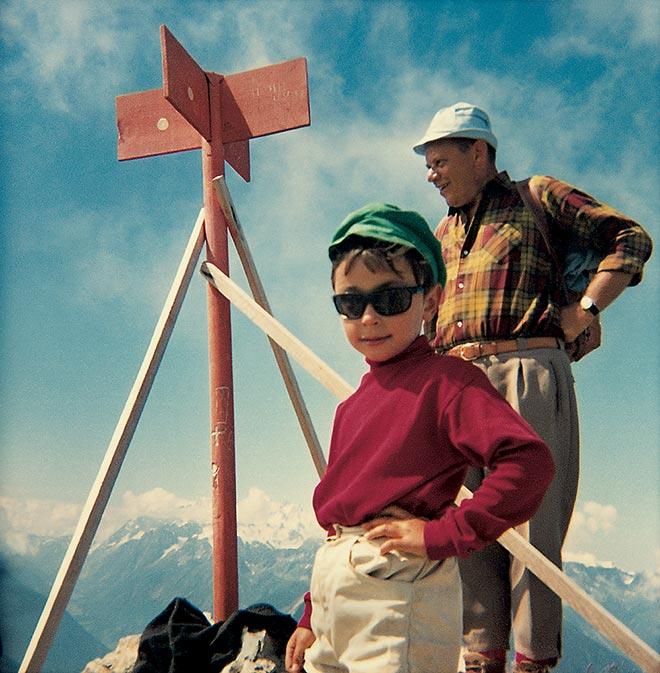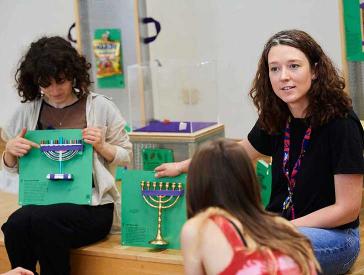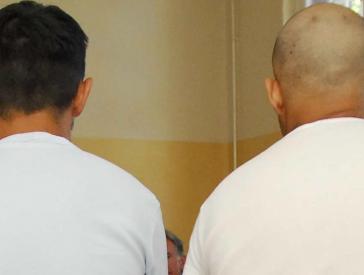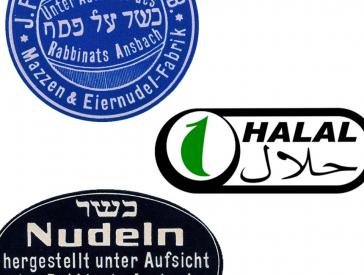
on.tour: The Jewish Museum Berlin Toured Schools
Our Traveling Educational Program for Schools All Across Germany 2007–2018
on.tour: The Jewish Museum Berlin Tours Schools was a traveling educational program that visited secondary schools and other institutions across Germany from 2007 to 2018. This way we could reach kids and teens who would otherwise not have had a chance to visit the Jewish Museum Berlin.
In 2020, the Jewish Museum Berlin will open its new core exhibition and a children's museum across the street. Building on the programmatic reorientation associated with these major projects, the outreach program will also be developed further in line with the times starting in 2019 (more on the new outreach programs).

Summer Tour 2007: The mobile exhibition Discover JMB is constructed in the schoolyard. June 2007. Jewish Museum Berlin, photo: Sönke Tollkühn
Where did on.tour operate?
- You could book on.tour for your desired location and dates.
- on.tour was a regular guest at the Plötzensee juvenile offenders’ institution, as well as trade fairs and expos, like the Leipzig Book Fair and didacta.
- By invitation, on.tour also traveled to city festivals, Jewish cultural days, church open houses, and other occasions, where we explained Jewish culture, history, and religion.
What did on.tour offer during a visit?
- A mobile exhibition about Jewish life, culture, and history
- Interactive tours of the mobile exhibition for students aged 10 and older, spanning two class periods (90 minutes)
- Workshops spanning three class periods (135 minutes), either about growing up Jewish after 1945 (It Was as Simple as That), suitable for ages 14 and older, or about Jewish life in Germany today (My Page(s)), suitable for ages 13 and older
- An opportunity for students to explore Jewish history, culture, and religion actively and directly
- Selected exhibition artifacts relating to teenage lives
Contact
on.tour
T +49 (0)30 25993 343
F +49 (0)30 259 93 328
ontour@jmberlin.de
Impressions

on.tour at the Jawaharlal-Nehru-Schule Neustrelitz: A guide and a student discuss an exhibition cube; Jewish Museum Berlin 2015, photo: Svea Pietschmann

on.tour at the Jawaharlal-Nehru-Schule Neustrelitz: Working with an iPad; Jewish Museum Berlin 2015, photo: Svea Pietschmann

Archival footage makes personal access possible – here in the workshop It Was as Simple as That; Jewish Museum Berlin 2008, photo: Sönke Tollkühn

on.tour-workshop: Workbook with photos and markers; Jewish Museum Berlin 2007, photo: Sönke Tollkühn
A Day on.tour: Schedule
Schedule
| time | Workshops in the class room | Guided tours through the exhibition (grade 5 up) | ||
|---|---|---|---|---|
| 1st period | 1st workshop: It was as simple as that (grade 9 up) or My page(s) (grade 8 up) |
building up the exhibition together with students; 1st guided tour |
||
| 2nd period | ||||
| 3rd period | 2nd guided tour | |||
| 4th period | 2nd workshop: It was as simple as that (grade 9 up) or My page(s) (grade 8 up) |
|||
| 5th period | 3rd guided tour | |||
| 6th period |
Deconstruction of the exhibition together with students after the 6th period.
During the main breaks we're offering a dialogue in the exhibition for all students.
Guided Tours
The mobile exhibition offered students aged 10 and up the opportunity to learn about Jewish traditions, festivals, and history in an independent, interactive fashion. Three staff members were in charge of the mobile exhibition. They took the school classes on 90-minute tours of the exhibition. Weather permitting, we set up the exhibition in the schoolyard, otherwise at a central location in the school building. We drove directly onto the schoolyard with our on.tour minibus and set up the exhibition outside the vehicle.
The students could sit on, rotate, and turn over the cubes. They were encouraged to explore the exhibition and learn about topics independently by reading short texts. From the life stories and various objects that they could pick up and thus literally "grasp," the students gain valuable insight into religious, cultural, and historical aspects of Judaism. After viewing the exhibition, the students gave presentations about what they have learned. The on.tour team supported them in the process, providing interesting facts about the objects, answering questions, and moderating the presentations.
Themes of the Exhibition
The five red cubes contained selected objects from the museum. In addition to exhibits on the Jewish religion and items linked to persecution, the cubes showed a variety of everyday objects, many of which were connected to the young people’s worlds. Religious artifacts and everyday objects provided information on how religion and daily life are intertwined. The Jewish holiday of Shabbat and various Jewish festivals such as Passover were presented as examples. The stories of the Julius Fromm company and Löb Strauss, a Jew from a rural community in southern Germany, offered historical and biographical perspectives.
 X
X
Children reading and comparing Jewish first names, past and present; Jewish Museum Berlin, photo: Svea Pietschmann
Workshops
In tandem with the exhibition, we held two workshops, each for one class at a time (max. 30 students). A workshop spanning three class periods (135 minutes), either dealed with growing up Jewish after 1945 (It Was as Simple as That), suitable for ages 14 and older, or Jewish life in Germany today (My Page(s)), suitable for ages 13 and older
It Was as Simple as That: Workshop on Growing Up Jewish after 1945
In this workshop, students aged 14 to 18 were divided into small groups and listened to audio stories to learn about the lives of a variety of people.
What was it like to grow up in Germany, Austria, or Switzerland after 1945? We posed this question to eighteen well-known and lesser-known, religious and not-so-religious Jews and recorded their answers. We also asked them for a photograph depicting a formative event in their childhood or adolescence.
Stories about the Past with a Bearing on the Present: The photos dated from 1947 to the early 1990s and captured contradictory moments in the interviewees’ lives: feelings of estrangement and belonging, escapes from daily routines, hopes and dreams.
At the conclusion of the workshop the groups discussed their results and related them to their own experiences.
 X
X
Daniel Wildmann on Pierre Avoi (in Valais, Switzerland), one of the speakers for It Was as Simple as That; photo: Paul Wildmann
My Page(s): Workshop on Identity, Ancestry, Faith, and Home
In this workshop, students aged 14 to 18 formed small groups and used media applications and video interviews to explore life stories.
Six Jewish teenagers and young adults living in Germany introduced themselves in interactive photo albums that could be viewed on tablets. Personal video interviews provided insights into the young people’s lives and daily routines and underscored the cultural diversity of Jewish life in Germany today. Using these presentations as a springboard, the workshop focused on the themes of identity, ancestry, faith, and home. The students were given the opportunity to draw connections between what they see and hear and themselves and to ask specific questions: How am I shaped by my family history? What do I believe in? What are other people’s beliefs? Where do I belong? What does “home” mean to me?
At the end of the program, the students discussed the themes and contents of the workshop together and made connections to their own experiences.
 X
X
Students discover the lives of Jewish teens in the workshop My Page(s); Jewish Museum Berlin, photo: Cornelius M. Braun











 X
X





